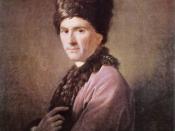The class discussion on Jean-Jacques Rousseau seems to have been far more active than the discussion on Hobbes. Personally, I believe this observation can be explained in that the excerpts selected offered concepts more easily understood. Although this paper will include notes taken in class from Discourse on the Origin of Social Inequality, The Social Contract, and Faith of a Savoyard Priest, I chose to read the first selection from the list. Although the class never really came to a consensus about the point of these articles, a few main points do seem to exist.
First, Jean-Jacques Rousseau seemed to have his mind set for his preferred government. He suggests that constant union (blood and laws), obedience to laws, and respect for ministers was key to survival, whereby a republic should not only be the ideal form of government, but should also be an example to other nations. His warning to this was to watch for "sinister constructions" and "venomous rumors."
Furthermore, Rousseau highlighted that focus of government should be on preservation and prosperity of its people. As far as rights, Rousseau (like Hobbes) believed that individuals could choose to forgo individual rights in order to achieve "civil tranquility." Giving up these rights would giver the power of government to the people as a whole where groups would be formed to have equal say when considering liberty. An example of this is paying taxes when the money gained from the taxes goes toward protection for all of the people. Using this standard, giving up freedom to support the common good allows for a greater gain of liberty than loss of liberty.
Inequality was a second major point in the excerpts we talked about in class. More specifically, Rousseau's thoughts on inequalities implied that people desire inequalities as a way...


